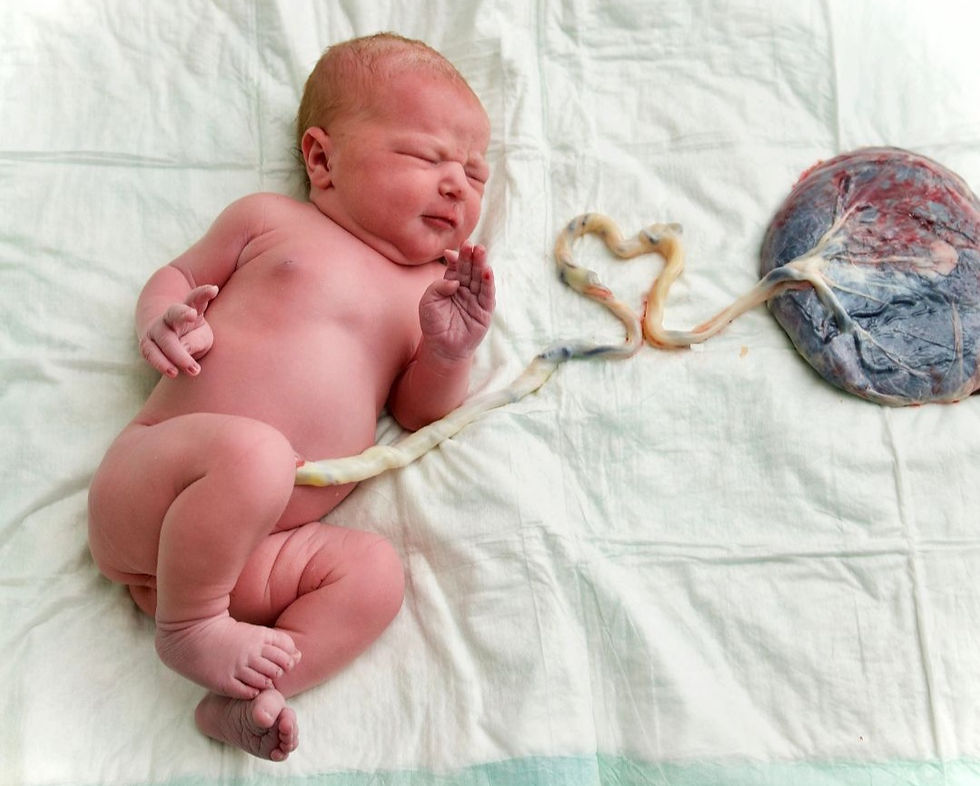Placenta Encapsulation• What You Should Know
- Kaleem Joy, Licensed Midwife

- May 15, 2023
- 3 min read
Updated: Apr 18

Your baby has had an amazing friend called their placenta. It's been with them their whole life up until just after they are born. Hopefully, you had one of the lucky baby's that was able to keep their cord intact until their placenta was born. They use their cord as a life line so you as their parent, can best support their transition into this new world of breathing, heart rerouting, warmth and fluids to get them through until milk comes in. Natural Childbirth 101 premium education will walk with you throughout your pregnancy for an empowering birth and on into a calm, confident postpartum.
After this amazing friend, the placenta has been born and given wonderful moments of gratitude for the work it did and a good look over, there is still more it can offer.
The placenta is packed full of nutrient, hormones and possibly good emotions as a gift from your baby to you. In the mammal world of which we humans are part of, mammal animals eat their placenta for a couple of reasons.
First because it is usually the only food they have had that day or maybe for two days depending on their need to be in their "cave" before giving birth. The labor itself, requested fuel from them and the placenta is a great way to fuel back up.
Second is to remove any concerns that a near by predator could come looking to eat it and or harm themselves or their young. Not usually what we humans have an issue with, however, if you tell someone you are consuming your placenta, they may choose to give you more space to settle in and snuggle with your baby rather than insist on being in your space right at first.
We as humans have opened this door back up to consuming our baby's placenta. Doing this does provide nourishment with lots of support for hormonal balance, iron restoring, nutrient dense food, increasing milk production and so much more. Let's just say this organ is the most supportive food a postpartum parent can eat.
I know what your thinking.... do they just cut it up and eat it raw? Well there may be some bold parents who would do this by putting a small raw frozen piece in the blender with a smoothie, however this is not what the majority of parents choose to do.
Placenta encapsulation has become the new wave of how parents are consuming them. Most parents contact a doula or specialist who will wash, steam, dehydrate, grind and then encapsulate the placenta into supplement size capsules. They usually prepare them with an attitude of reverence and positive energy. Often an 8 pound baby will have a placenta that will yield about 100-150 capsules. Everything is very clean and sterilized between clients. They even add some cute packaging, and sometimes little extras like, tinctures, cord keep sake or print if desire.
What's the cost? Average cost is from $200-400 per placenta. Often they give a discount for Twins.
How much and how often do you take them? Most recommendations are between 2-6 in a day. With my clients we suggested they take 1-2 in the morning and again at bedtime. If they wanted more energy or support to add 2 more in the day. If there are capsules left over by 6 weeks they can either continue to take them or put them in an air tight contain and store in the freezer and take if they feel they need a boost to their milk or emotions. The tincture has an almost indefinite shelf life and some say they can be used for the baby's teething or even puberty.
Where can you find an encapsulation specialist? Call your local doulas, homebirth or birth center midwives or childbirth educators and ask for a referral. You can also search Google for Placenta encapsulation in your city or county. Natural Childbirth 101 is dedicated to educating parents to know their choices and options for care as do many midwifery practices and doula services.
Questions to ask before hiring? How do you go about pick up and delivery?, How much do you charge and what does that cover? Why do you do this service? What distance will you travel? Do they steam or do raw into the dehydrator and do you have a choice which you would prefer? Do they require any copies of your lab tests for HIV and Hepatitis?
Now it's up to you to decide what you will do with your baby's placenta after birth. Will you throw it away, bury it with a new fruit tree or rose bush, or will you encapsulate it to support you for the first 6 weeks after birth.
Please share this post and let others know you found it on Natural Childbirth 101. Thank you for stopping by, and many blessings on your birth and baby.



Comments